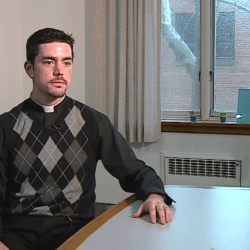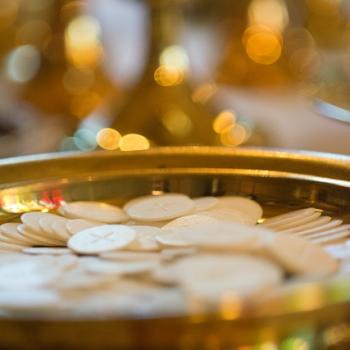A couple weeks ago, Fr. Roger Landry wrote a column for his diocesan newspaper in which he argued that, yes, it does:
When people come to a Church that is anything but standing room only, where they opt to worship indicates something about their attitude toward involvement at Mass.
Sitting up front is normally a sign of eagerness and excitement. Sitting in the back likely suggests that the person is approaching more as a spectator than as a zealous participant.
If we consider the two places in which many commonly prefer the backseats — school buses and classrooms — we all know that the rationale is not so they will behave or learn better; it’s to get out of the easy sight of the driver and teacher.
What about sitting in the back row at Church? Few of us, if we saw a pair of 13 year-old boys sitting in the last pew, would think that they had chosen that location in order to pray the Mass better. But does that same pew suddenly become a better location to pray the Mass the older one gets?
Some Catholics who are by no means literalistic interpreters of Sacred Scripture behave as quasi-fundamentalists when it comes to Jesus’ words about where to sit during worship.
In one parable, Jesus contrasts a proud tax collector praying to himself in the front of the Church and a penitent tax collector praying for mercy in the back row, with only the latter leaving the Temple with his prayer heard. In another parable, Jesus describes that we should take the lowest rather than the highest place at a wedding banquet so that the host will say to us, “My friend, move up to a higher position,” and win us the esteem of all our companions. People have been fighting for the publican’s low seat ever since.
Once upon a time in heavily Catholic areas in New England, even our largest Churches were standing room only at all Sunday Masses. To sit down anywhere was a triumph. But now even in our mid-size Churches, occupancy is often less than fifty percent at many Masses.
There’s a choice where we can sit. And I’d urge you to choose to sit up front.
He offered several reasons for his rationale, which led a few people to write to him in response:
A couple of emails were critical. I’d like to share one of them because it highlights something important not just for this conversation but for the overall mission of the Church.
“I read your Anchor column a few times. It bothers me more each time I read it,” one honest reader wrote. “I am a back-bencher myself and don’t intend to move. I would think God and clergy would be glad to have any seat occupied. It’s hard for me to imagine that God is particularly concerned with who sits where at Mass or that where you sit says something about your faith, commitment or spirituality. Seating location seems a most silly measure of faith.
“Being a committed Catholic is, at times, not easy. Having clergy suggest that where you sit at Mass might be a problem is yet another, admittedly trivial, obstacle to thoughtful, active practitioners discovering the open, welcoming, inclusive aspects of our faith, our church and our calling. Perhaps a better message to deliver via The Anchor would be “Come! Join us! We don’t care where you sit just as long as you are here.”
I replied to this reader, “Thanks for writing! I respectfully think you missed the point of the column, which was that it’s better to sit together as a family of faith up front for all the reasons given, not that it’s sinful to sit in the back, in a similar way that it’s better to come well-dressed to Church than to come in shorts and tank-tops. It’s the difference between good and better.
“If you’re a dad and had your kids come to the same Mass as you, would it not matter to you in the least if they sat with you or instead sat as far as possible away from you? My guess would be that you’d first be happy your kids were at Mass, but you’d also hope for more. That’s what the column was about.
“From the point of view of clergy, we do want more than people merely coming to Mass. The minimum should never become the maximum. We want people growing in faith, and not just as individuals, but as a family of faith. That’s what a parish is meant to be. And when the people of a parish don’t get to know each other, wave the sign of peace to each other, don’t share in each other’s joys or disappointments, and other similar behaviors, there’s much room for improvement…”
You can read the rest here.
Okay. I tend to agree that where we choose to position ourselves often signifies a level of engagement and interest. Where we sit, to a certain extent, matters.
But so does where we situate ourselves. I’ve often found that the experience of the Mass is very different when you sit in the middle or near the back—as part of a great cloud of witnesses—than when you sit near the front and feel like every word and gesture is directed to you and you alone. There is a deeper and more complete sense of community when you are surrounded by your brothers and sisters in faith; you feel more a part of the Body of Christ.
I also think where we sit says something about our own personal spirituality.
Where are we comfortable? Where do we think we belong? How do we see ourselves as members of the larger community? How do we gauge our worthiness?
There have been moments in my spiritual life when I felt more comfortable hidden in the crowd—obscure, out of the way, undetectable. For years, I consciously arrived at Mass late, and carefully chose to sit on the aisle in one of the last pews of the church. I figured that was where I could do the least harm—and where the fewest number of people would be injured by heavenly lightning bolts hurled in my direction.
But my plan didn’t quite work. What I didn’t realize is that guys like me are also prime candidates to help take up the collection. When they’re short-handed, the head usher usually pulls someone from the back pew, hands him a basket, and puts him to work. That was what happened to me. And that was my first (albeit, reluctant) job in church ministry.
The rest is history.
So, I take a sympathetic view of those uncertain souls who like to hug the last pew. They are there for a reason. We may not know it. But God does.
And—as I learned—it is there that God will often do his most surprising work.












